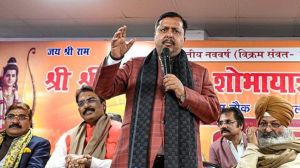Empowered by the Pope
The performance of the last rites symbolises closure. Closure is an experience of liminality: an end and a beginning. Today8217;s interment...

The performance of the last rites symbolises closure. Closure is an experience of liminality: an end and a beginning. Today8217;s interment of the Pope in St Peter8217;s basilica is no exception. It marks for Catholics the true end of the second and the opening of the third millennium. Five years ago the 80-year old Pontiff lived with spiritual intensity the transition into the new century. His burial puts the seal on that crossing.
Like Poland, a martyr nation wedged between the Russian and Germanic empires, Karol Wojtyla survived by holding on to his religious tradition and updating it. His intellectual search led him to views on 8216;8216;personalism8217;8217;. 8216;8216;Person8217;8217; spells human rights. From it springs the passionate affirmation of human life, 8216;8216;from womb to tomb8217;8217;. Personalism blossomed into a metaphysical humanism. In 1998 the Pope wrote admiringly of Indian philosophical traditions: 8220;My thoughts turn immediately to the lands of the East, so rich in religious and philosophical traditions of great antiquity8230; A great spiritual impulse leads Indian thought to seek an experience that liberates the spirit from the shackles of time and space and therefore acquires absolute value.8221;
Some moments in John Paul II8217;s life mark the agenda for the coming decades. One is his courageous confession of the sins of the Church in history. The counterpart of confession was forgiveness. It moved him to his 1983 visit to the prison cell of his failed assassin. Forgiveness with its implied repentance is an unfinished task we all take to the new era.
John Paul II has been criticised for his 8216;8216;conservative8217;8217; attitudes on of sex and marriage. Much of his early writing on sexuality was a search for light on the new problems thrown up by a culture that has jettisoned the traditional guidelines of morality. He developed a 8216;8216;theology of the body8217;8217;. We all need cultural and moral rethinking in this area.
A third area requiring the Catholic Church to grow is the distribution of power. The democratic ethos is firmly implanted around the world and has been sanctioned by Christian teaching. John Paul II made efforts to internationalise the administration of the church. But the decentralisation is incomplete. The 8220;synods of bishops8221; have not functioned effectively. Induction of women in the church8217;s administrative and decision-making bodies remains an urgent task.
What John Paul II did effectively was bringing together believers of all religions and authentic humanists to fight what diminishes human beings: violence, consumerism, hedonism, materialism, communalisms, social and economic injustice. We all need to join forces and work for a world where human values are upheld by common consent, in a spirit of freedom.
The writer is a senior theologian associated with Vidyajyoti seminary, Delhi
- 01
- 02
- 03
- 04
- 05































